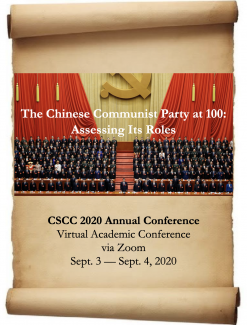Event
 The Chinese Communist Party at 100: Assessing Its Roles
The Chinese Communist Party at 100: Assessing Its Roles
CSCC 8th Annual Conference

Conference Papers Download Link
As the Chinese Communist Party nears the one hundredth anniversary of its founding and moves toward Xi Jinping extending his tenure beyond the (fragile) norm of a decade in the top Party (and state) posts, there are major issues concerning the Party’s changing roles in recent years and prospects for future developments: the Party’s relationship with other major institutions, including government / state organs, the military, and courts and the legal system; the Party’s relationship with economic actors and social groups, including state-owned or state-linked enterprises, entrepreneurs and private businesses, old and new media, and civil society / non-governmental organizations; and other perennially important issues for the Party, including ideology, corruption, policy implementation, external relations (such as united front work or soft power efforts, as distinct from the state’s foreign policy), and intra-elite politics. What is the Party’s role in each of these issue areas? Where has it succeeded and what challenges does it face? Has there been an inflection point or significant change during the Xi era, or is there some other inflection point? What are the prospects as the Party enters its second century? To address such questions, the conference will convene a group of leading China scholars to share their expertise and insights.
(This conference is open to University of Pennsylvania faculty, students, postdocs, and staff, and affiliates of the Center for the Study of Contemporary China. Others may join with permission and subject to capacity constraints. Please RSVP at https://forms.gle/MAGBeKfuE4CXfk6D9 to receive a Zoom link.)
Thursday, September 3, 2020
1:00-1:15 PM Opening Remarks
Panel 1 (1:15- 2:45 PM)
Margaret Pearson, University of Maryland
Business and the Party
Yue Hou, University of Pennsylvania
The Party and the Private Sector
Discussants:
Scott Kennedy, Center for Strategic and International Studies
Marshall Meyer, University of Pennsylvania
Chair: Regina Abrami, University of Pennsylvania
Panel 2 (3:00- 4:45 PM)
Bruce Dickson, George Washington University
The Party Leads It All: The Return of Leninism with Chinese Characteristics for a New Era
Cheng Li, Brookings Institution
Intra-Party Elite Politics: Reign and Resilience in the Xi Jinping Era
Cheng Chen, SUNY Albany
Ideology and Organization: Xi Jinping’s Party-Building in Historical Perspective
Discussants:
Rory Truex, Princeton University
Joe Fewsmith, Boston University
Yuhua Wang Harvard University
Chair: Avery Goldstein, University of Pennsylvania
Panel 3 (5:00-6:30 PM)
Bates Gill, Macquarie University
The Party and External Relations
Andrew Scobell, RAND Corporation and Marine Corps University
The Party in Uniform:The Institutional Irony of Chinese Gun Control
Discussants:
Joseph Torigian, American University
Avery Goldstein, University of Pennsylvania
Chair: Jacques deLisle, University of Pennsylvania
Friday, September 4, 2020
Panel 4 (8:00-9:30AM)
Xin He, University of Hong Kong
The Party’ Control over the Judiciary after Recent Reforms
Melanie Manion, Duke University
Corruption and Chinese Communist Party Power
Discussants:
Jacques deLisle, University of Pennsylvania
Jamie Horsley, Yale Law School
Yuhua Wang, Harvard University
Chair: Neysun Mahboubi, University of Pennsylvania
Panel 5 (9:45- 11:15AM)
Yanhua Deng, Nanjing University
The Party Rules All: The Impact of Multiple-Job Holding in Rural China
Fenggang Yang, Purdue University
The Chinese Communist Party and Religion
Discussants:
Emily Hannum, University of Pennsylvania
Matthew Erie, University of Oxford
Chair: Guobin Yang, University of Pennsylvania
Panel 6 (11:30- 1:00PM)
Maria Repnikova, Georgia State University
The Party and the Media: Unpacking the Dynamic Relationship and the Challenges Ahead
Diana Fu, University of Toronto; Emile Dirks, University of Toronto
The Party’s Struggle to Tame Civil Society
Discussants:
Min Jiang, UNC Charlotte
Guobin Yang, University of Pennsylvania
Chair: Emily Hannum, University of Pennsylvania
